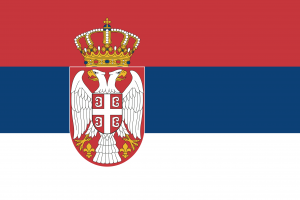Language/Serbian/Vocabulary/Animals
Hi Serbian learners! 😊
In this lesson, we will be learning the names of animals in Serbian. Animals are an important part of our cultural life, and learning about them will help you better understand our language and culture. So, let's get started! Don't forget to use the Find native speakers link if you have any questions and check out the questions related to the vocabulary on Polyglot Club's 𝑉𝑜𝑐𝑎𝑏𝑢𝑙𝑎𝑟𝑦 page!
Basic Vocabulary[edit | edit source]
Let's start with some of the basic vocabulary:
| Serbian | Pronunciation | English |
|---|---|---|
| pas | pàs | dog |
| mačka | màčka | cat |
| ptica | ptítsa | bird |
| riba | ríba | fish |
Here are some examples of how you can use these words in context:
- Person 1: Videla sam jednog psa na putu. (I saw a dog on the road.)
- Person 2: Jel' bio ljut na tebe? (Was he mad at you?)
- Person 1: Ne, bio je prijateljski nastrojen. (No, he was friendly.)
- Person 1: Zanima me kako se zove ova mačka. (I am curious about the name of this cat.)
- Person 2: Ne znam ali je slatka, nema dlake na malom delu tela i krzno joj je prelepo. (I don't know, but she is cute. She has no hair on a small part of her body, and her fur is beautiful.)
- Person 1: Kakva je ta ptica? Nisam videla takvu pre. (What kind of bird is that? I haven't seen it before.)
- Person 2: To je sokol. Oni su prilično retki u ovom kraju. (That is a falcon. They are pretty rare in this area.)
- Person 1: Volim jesti ribu. (I love to eat fish.)
- Person 2: Jeste li bili na Zlatarskom jezeru? To je najbolje mesto za ribolov u ovom delu zemlje. (Have you been to Zlatarsko jezero? That is the best place for fishing in this part of the country.)
Intermediate Vocabulary[edit | edit source]
Now, let's move on to some intermediate level vocabulary:
| Serbian | Pronunciation | English |
|---|---|---|
| konj | kònj | horse |
| svinja | svȉnja | pig |
| krava | kràva | cow |
| ovca | òvca | sheep |
Here are some examples of how to use these words in context:
- Person 1: Pogledaj onog konja u polju. (Look at that horse in the field.)
- Person 2: On je prelep primerak. (He is a beautiful specimen.)
- Person 1: Zašto smrde ove svinje? (Why do these pigs smell bad?)
- Person 2: To je zato što su blizu jedna drugoj i ne mogu se dovoljno kretati. (That is because they are close to each other and cannot move around enough.)
- Person 1: Ova krava mi izgleda vrlo zdrava. (This cow looks very healthy to me.)
- Person 2: Da, to je zato što se hrani zdravom hranom. (Yes, that is because she is eating healthy food.)
- Person 1: Zašto ovce mrze kišu? (Why do sheep hate rain?)
- Person 2: Zato što njihova vuna upija vodu i postaje teška. (Because their wool absorbs water and becomes heavy.)
Advanced Vocabulary[edit | edit source]
Finally, let's learn some of the advanced vocabulary:
| Serbian | Pronunciation | English |
|---|---|---|
| slon | slòn | elephant |
| majmun | màjmun | monkey |
| lav | làv | lion |
| medved | médved | bear |
Here are some examples of how to use these words in context:
- Person 1: Onaj slon je ogroman! (That elephant is enormous!)
- Person 2: Da, to je zato što su slonovi, po mnogo čemu najveće životinje na svetu! (Yes, that is because elephants are, in many ways, the largest animals in the world!)
- Person 1: Pogledaj onog majmuna kako se penje po drvetu! (Look at that monkey climbing up the tree!)
- Person 2: On je veoma spreman i brz u penjanju! (He is very agile and quick at climbing!)
- Person 1: Lav je moj omiljeni afrički životinja. (The lion is my favorite African animal.)
- Person 2: Da, to je zato što su lavovi simbol snažne i hrabre životinje. (Yes, that is because lions are a symbol of strength and courage.)
- Person 1: Da li ste ikada videli medveda u divljini? (Have you ever seen a bear in the wild?)
- Person 2: Ne, ali sam čuo da je to veoma uzbudljivo iskustvo! (No, but I have heard that it is a very exciting experience!)
I hope you have enjoyed learning these Serbian animal vocabulary words. Remember, the best way to practice is by talking to native speakers, so don't be afraid to make mistakes! Use the Find native speakers link to connect with other Serbian speakers in the community.
➡ If you have any questions, please ask them in the comments section below.
➡ Feel free to edit this wiki page if you think it can be improved. 😎
Other Lessons[edit | edit source]
- Adjectives in Serbian
- Fruits
- Problems in Serbian
- Free Time Activities
- Days of the week
- Drinks
- Count from 1 to 10
- Shopping
- Body Parts
- Dinner Table
Sources[edit | edit source]
- Learn Serbian - Lesson 8: Animals | L-Lingo
- Serbian lessons: Farm animals
- Animal Names in Serbian | Pinhok Languages

